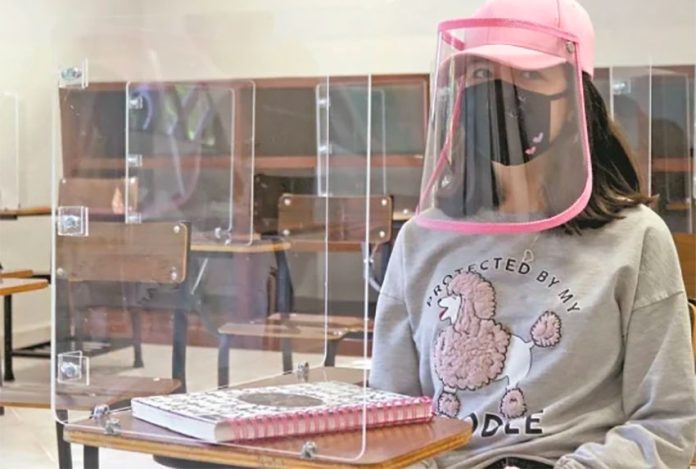When Mexico’s schools reopen remains uncertain but measures to protect students and teachers from the coronavirus are being prepared.
One school that has been planning for the eventual opening — schools were closed across Mexico in mid-March — is Universidad Motolinía, a private Christian school in Mexico City that has announced strict coronavirus protocols.
Its measures go beyond those planned in the public school system, where teachers have expressed concern that they don’t go far enough.
Motolinía’s 600 students, ranging from preschool to high school, will have to pass through virus protection tunnels before entering the school. Their temperatures will be taken and blood oxygen levels tested. Face shields and hand sanitizer will be required and Plexiglas shields will surround each desk.
In the cafeteria, students will have 15 minutes to eat their lunch surrounded by a Plexiglas barrier.
During recess, students will not be allowed to play with balls or engage in any other activity which may lead to direct contact with other students. Singing and dancing at a safe social distance will be encouraged.
Although the school year is supposed to begin August 10, the first day of school may be postponed due to the coronavirus as schools are not permitted to open until the state they are in is classified as “green” on the government’s coronavirus risk map, indicating the risk of contracting the virus is low.
Last week the Ministry of Public Education (SEP) sent public schools guidelines for their eventual reopening, which include the use of masks or bandanas, soap and water, and a staggered attendance schedule depending on the first letter of a student’s last name.
Entrance exams for secondary school have been canceled, as have all assemblies and parent-teacher conferences.
Still, some public school teachers feel the government protocols are not enough to keep students and education workers safe.
A poll in Mexico City indicated that 80% of the 2,203 teachers and principals surveyed do not feel that the government’s protocols will help protect staff and students.
More than one-third of teachers in Mexico City work in schools with insufficient drinking water and no cleaning supplies. Additionally, 11% of teachers said their schools were still damaged from the September 2017 earthquake.
The teachers surveyed would like the SEP to take steps similar to what Motolinía is implementing and provide schools with digital thermometers, oximeters, cleaning supplies, masks, face shields and Plexiglas shields for desks.
Teachers also want the SEP to hire doctors, nurses and special cleaning crews for schools, as well as establish a defined protocol for working with disabled students, where physical contact is often necessary.
“We will never, for any reason, risk the health of children and teachers,” said the SEP’s Marcos Bucio. “Students will return to class as soon as there is not a single risk in the classroom for children and teachers.”
Source: El Universal (sp), Milenio (sp), La Silla Rota (sp)
